 Полная версия
Полная версияLittle Lucy's Wonderful Globe
Then came a merry, merry voice singing something about la vendemmia; and though Lucy had never learnt Italian, her wonderful dream knowledge made her sure that this meant the vintage, the grape-gathering; and presently there came along a little girl dancing and beating a tambourine, with a basket fastened to her back, filled to overflowing with big, beautiful bunches of grapes: and a whole party of other children, all loaded with as many grapes as they could carry, came leaping and singing after her; their black hair loose, or sometimes twisted with vine-leaves; their big black eyes dancing with merriment, and their bare brown legs with glee.
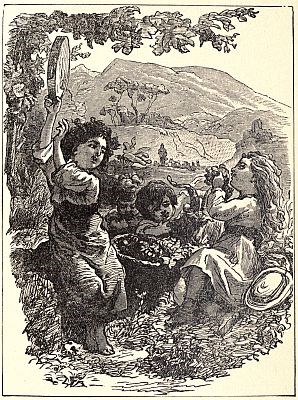
"Ah! Cecco, Cecco!" cried the little girl, pausing as she beat her tambourine.
"Ah! Cecco, Cecco!" cried the little girl, pausing as she beat her tambourine, "here's a stranger who has no grapes; give them here!"
"But," said Lucy, "aren't they your Mamma's grapes; may you give them away?"
"Ah, ah! 'tis the vendemmia! all may eat grapes; as much as they will. See, there's the vineyard."
Lucy saw on the slope of the hill above the cottage long poles such as hops grow upon, and vines trained about hither and thither in long festoons, with leaves growing purple with autumn, and clusters hanging down. Men in shady battered hats, bright sashes and braces, and white shirt sleeves, and women with handkerchiefs folded square over their heads, were cutting the grapes down, and piling them up in baskets; and a low cart drawn by two mouse-coloured oxen, with enormous wide horns and gentle-looking eyes, was waiting to be loaded with the baskets.
"To the wine-press! to the press!" shouted the children, who were politeness itself and wanted to show her everything.
The wine-press was a great marble trough with pipes leading off into other vessels around. Into it went the grapes, and in the midst were men and boys and little children, all with bare feet and legs up to the knees, dancing and leaping, and bounding and skipping upon the grapes, while the red juice covered their brown skins.
"Come in, come in; you don't know how charming it is!" cried Cecco. "It is the best time of all the year, the dear vintage; come and tread the grapes."
"But you must take off your shoes and stockings," said his sister, Nunziata; "we never wear them but on Sundays and holidays."
Lucy was not sure that she might, but the children looked so joyous, and it seemed to be such fun, that she began fumbling with the buttons of her boots, and while she was doing it she opened her eyes, and found that her beautiful bunch of grapes was only the cushion in the bottom of Mother Bunch's chair.
CHAPTER IV.
GREENLAND
"Suppose and suppose I tried what the very cold countries are like!"
And Lucy bent over the globe till she was nearly ready to cut her head off with the brass meridian, as she looked at the long jagged tongue, with no particular top to it, hanging down on the east side of America. Perhaps it was the making herself so cold that did it, but she found herself in the midst of snow, snow, snow. All was snow except the sea, and that was a deep green, and in it were monstrous floating white things, pinnacled all over like the Cathedral, and as big, and with hollows in them of glorious deep blue and green, like jewels; Lucy knew they were icebergs. A sort of fringe of these cliffs of ice hemmed in the shore. And on one of them stood what she thought at first was a little brown bear, for the light was odd, the sun was so very low down, and there was so much glare from the snow that it seemed unnatural. However, before she had time to be afraid of the bear, she saw that it was really a little boy, with a hood and coat and leggings all of thick, thick fur, and a spear in his hand, with which he every now and then made a dash at a fish,—great cod fish, such as Mamma had, with oysters, when there was a dinner-party.
Into them went his spear, up came the poor fish, and was strung with some others on a string the boy carried. Lucy crept up as well as she could on the slippery ice, and the little Esquimaux stared at her with a kind of stupid surprise.
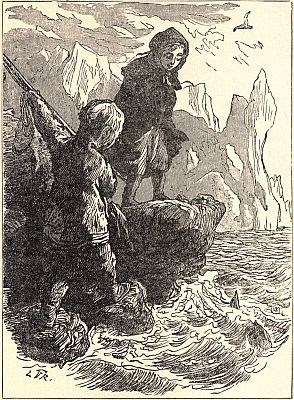
"Is that the way you get fish?" she asked.
"Is that the way you get fish?" she asked.
"Yes, and seals; Father gets them," he said.
"Oh, what's that, swimming out there?"
"That's a white bear," he said, coolly; "we had better get home."
Lucy thought so indeed; only where was home? that puzzled her. However, she trotted along by the side of her companion, and presently came to what might have been an enormous snowball, but there was a hole in it. Yes, it was hollow; and as her companion made for the opening, she saw more little stout figures rolled up in furs inside. Then she perceived that it was a house built up of blocks of snow, arranged so as to make the shape of a beehive, all frozen together, and with a window of ice. It made her shiver to think of going in, but she thought the white bear might come after her, and in she went. Even her little head had to bend under the low doorway, and behold it was the very closest, stuffiest, if not the hottest place she had ever been in! There was a kind of lamp burning in the hut; that is, a wick was floating in some oil, but there was no glass, such as Lucy had been apt to think the chief part of a lamp, and all round it squatted upon skins these queer little stumpy figures, dressed so much alike that there was no knowing the men from the women, except that the women had much the biggest boots, and used them instead of pockets, and they had their babies in bags of skin upon their backs.
They seemed to be kind people, for they made room by their lamp for the little girl, and asked her where she had been wrecked, and then one of the women cut off a great lump of raw something—was it a walrus, with that round head and big tusks?—and held it up to her; and when Lucy shook her head and said, "No, thank you," as civilly as she could, the woman tore it in two, and handed a lump over her shoulder to her baby, who began to gnaw it. Then her first friend, the little boy, hoping to please her better, offered her some drink. Ah! it was oil, just like the oil that was burning in the lamp!—horrid train-oil from the whales! She could not help shaking her head, so much that she woke herself up!
CHAPTER V
TYROL
"Suppose and suppose I could see where that dear little black chamois horn came from! But Mother Bunch can't tell me about that I'm afraid, for she always went by sea, and here's the Tyrol without one bit of sea near it. It's just one of the strings to the great knot of mountains that tie Europe up in the middle. Oh! what is a mountain like?"
Then suddenly came on Lucy's ears a loud blast like a trumpet; another answered it farther off, another fainter still, and as she started up she found she was standing on a little shelf of green grass with steep slopes of stones and rock above, below, and around her; and rising up all round huge, tall hills, their smooth slopes green and grassy, but in the steep places, all steep, stern cliff and precipice, and as they were seen further away they were of a beautiful purple, like a thunder-cloud. Close to Lucy grew blue gentians like those in Mamma's garden, and Alpine roses, and black orchises; but she did not know how to come down, and was getting rather frightened when a clear little voice said, "Little lady, have you lost your way? Wait till the evening hymn is over, and I'll come and help you;" and then Lucy stood and listened, while from all the peaks whence the horns had been blown there came the strong sweet sound of an evening hymn, all joining together, while there arose distant echoes of others farther away. When it was over, one shout of "Jodel" echoed from each point, and then all was still except for the tinkling of a little cow-bell. "That's the way we wish each other good night," said the little girl, as the shadows mounted high on the tops of the mountains, leaving them only peaks of rosy light. "Now come to the châlet, and sister Rose will give you some milk."

"Help me, I'm afraid," said Lucy.
"Help me. I'm afraid," said Lucy.
"That is nothing," said the mountain maiden springing up to her like a kid, in spite of her great heavy shoes; "you should see the places Father and Seppel climb when they hunt the chamois."
"What is your name?" asked Lucy, who much liked the looks of her little companion in her broad straw hat, with a bunch of Alpine roses in it, her thick striped frock, and white body and sleeves, braced with black ribbon; it was such a pleasant, fresh, open face, with such rosy cheeks and kindly blue eyes, that Lucy felt quite at home.
"I am little Katherl. This is the first time I have come up with Rose to the châlet, for I am big enough to milk the cows now. Ah! do you see Ilse, the black one with a white tuft? She is our leading cow, and she knows it, the darling. She never lets the others get into dangerous places they cannot come off; she leads them home, at a sound of the horn; and when we go back to the village, she will lead the herd with a nosegay on the point of each horn, and a wreath round her neck. The men will come up and fetch us, Seppel and all; and may be Seppel will bring the medal for shooting with the rifle."
"But what do you do up here?"
"We girls go up for the summer with the cows to the pastures, the grass is so rich and good on the mountains, and we make butter and cheese. Wait, and you shall taste. Sit down on that stone."
Lucy was glad to hear this promise, for the fresh mountain air had made her hungry. Katherl skipped away towards a house with a projecting wooden balcony, and deep eaves, beautifully carved, and came back with a slice of bread and delicious butter, and a good piece of cheese, all on a wooden platter, and a little bowl of new milk. Lucy thought she had never tasted anything so nice.
"And now the gracious little lady will rest a little while," said Katherl, "whilst I go and help Rosel to strain the milk."
So Lucy waited, but she felt so tired with her scramble that she could not help nodding off to sleep, though she would have liked very much to have stayed longer with the dear little Tyrolese. But we know by this time where she always found herself when she awoke.
CHAPTER VI.
AFRICA
Oh! oh! here is the little dried crocodile come alive, and opening a horrible great mouth lined with terrible teeth at her.
No, he is no longer in the museum; he is in a broad river, yellow, heavy, and thick with mud; the borders are crowded with enormous reeds and rushes; there is no getting through; no breaking away from him; here he comes; horrid, horrid beast! Oh, how could Lucy have been so foolish as to want to travel in Africa up to the higher parts of the Nile? How will she ever get back again? He will gobble her up, her and Clare, who was trusted to her, and whatever will Mamma and sister do?
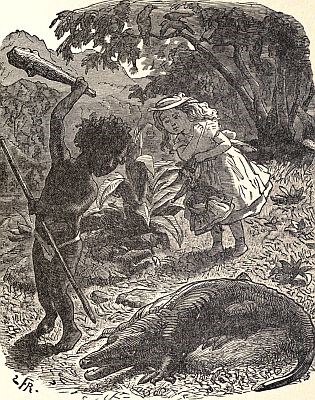
Hark! There's a cry, and out jumps a little black figure, with a stout club in his hand.
Hark! There's a cry, a great shout, and out jumps a little black figure, with a stout club in his hand: smash it goes down on the head of master crocodile; the ugly beast is turning over on its back and dying. Then Lucy has time to look at the little Negro, and he has time to look at her. What a droll figure he is, with his woolly head and thick lips, the whites of his eyes and his teeth gleaming so brightly, and his fat little black person shining all over, as well it may, for he is rubbed from head to foot with castor-oil. There it grows on that bush, with broad, beautiful, folded leaves and red stems and the pretty grey and black nuts. Lucy only wishes the negroes would keep it all to polish themselves with, and not send any home.
She wants to give the little black fellow some reward for saving her from the crocodile, and luckily Clare has on her long necklace of blue glass beads. She puts it into his hand, and he twists it round his black wool, and cuts such dances and capers for joy that Lucy can hardly stand for laughing; but the sun shines scorching hot upon her, and she gets under the shade of a tall date palm, with big leaves all shooting out together at the top, and fine bunches of dates below, all fresh and green, not dried like those Papa sometimes gives her at dessert.
The little negro, Tojo, asks if she would like some; he takes her by the hand, and leads her into a whole cluster of little round mud huts, telling her that he is Tojo, the king's son; she is his little sister, and these are all his mothers! Which is his real mother Lucy cannot quite make out, for she sees an immense party of black women, all shiny and polished, with a great many beads wound round their heads, necks, ankles, and wrists; and nothing besides the tiniest short petticoats: and all the fattest are the smartest; indeed, they have gourds of milk beside them, and are drinking it all day long to keep themselves fat. No sooner however is Lucy led in among them, than they all close round, some singing and dancing, and others laughing for joy, and crying, "Welcome little daughter, from the land of spirits!" and then she finds out that they think she is really Tojo's little sister, who died ten moons ago, come back again from the grave as a white spirit.
Tojo's own mother, a very fat woman indeed, holds out her arms, as big as bed-posts and terribly greasy, gives her a dose of sour milk out of a gourd, makes her lie down with her head in her lap, and begins to sing to her, till Lucy goes to sleep; and wakes, very glad to see the crocodile as brown and hard and immovable as ever; and that odd round gourd with a little hole in it, hanging up from the ceiling.
CHAPTER VII.
LAPLANDERS
"It shall not be a hot country next time," said Lucy, "though, after all, the whale oil was not much worse than the castor oil.—Mother Bunch, did your whaler always go to Greenland, and never to any nicer place?"
"Well, Missie, once we were driven between foul winds and icebergs up into a fiord near North Cape, right at midsummer, and I'll never forget what we saw there."
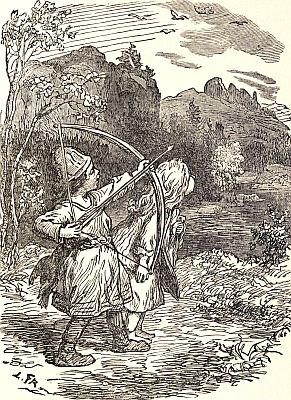
And here beside her was a little fellow with a bow and arrows, such as she had never seen before.
Lucy was not likely to forget, either, for she found herself standing by a narrow inlet of sea, as blue and smooth as a lake, and closely shut in, except on the west, with red rocky hills and precipices with pine-trees growing on them, except where the bare rock was too steep, or where on a somewhat smoother shelf stood a timbered house, with a farm-yard and barns all round it. But the odd thing was that the sun was where she had never seen him before,—quite in the north, making all the shadows come the wrong way. But how came the sun to be visible at all so very late? Ah! she knew it now; this was Norway, and there was no night at all!
And here beside her was a little fellow with a bow and arrows, such as she had never seen before, except in the hands of the little Cupids in the pictures in the drawing-room. Mother Bunch had said that the little brown boys in India looked like the bronze Cupid who was on the mantelshelf, but this little boy was white, or rather sallow-faced, and well dressed too, in a tight, round, leather cap, and a dark blue kind of shaggy gown with hairy leggings; and what he was shooting at was some kind of wild-duck or goose, that came tumbling down heavily with the arrow right across its neck.
"There," said the boy, "I'll take that, and sell it to the Norse bonder's wife up in the house above there."
"Who are you, then?" said Lucy.
"I'm a Lapp. We live on the hills, where the Norseman has not driven us away, and the reindeer find their grass in summer and their moss in winter."
"Oh! have you got reindeer? I should so like to see them and to drive in a sledge!"
The boy, whose name was Peder, laughed, and said, "You can't go in a sledge except when it is winter, with snow and ice to go upon, but I'll soon show you a reindeer."
Then he led the way, past the deliciously smelling, whispering pine-woods that sheltered the Norwegian homestead, starting a little aside when a great, tall, fair-faced, fair-haired Norse farmer came striding along, singing some old old song, as he carried a heavy log on his shoulder, past a seater or mountain meadow where the girls were pasturing their cows, much like Lucy's friends in the Tirol, out upon the grey moorland, where there was an odd little cluster of tents covered with skins, and droll little, short, stumpy people running about them.
Peder gave a curious long cry, put his hand in his pocket, and pulled out a lump of salt. Presently, a pair of long horns appeared, then another, then a whole herd of the deer with big heads and horns growing a good deal forward. The salt was held to them, and a rope was fastened to all their horns that they might stand still in a line, while the little Lapp women milked them. Peder went up to one of the women, and brought back a little cupful for his visitor; it was all that one deer gave, but it was so rich as to be almost like drinking cream. He led her into one of the tents, but it was very smoky, and not much cleaner than the Esquimaux. It is a wonder how Lucy could go to sleep there, but she did, heartily wishing herself somewhere else.
CHAPTER VIII.
CHINA
Was it the scent of the perfumed tea, a present from an old sailor friend, which Mrs. Bunker was putting away, or was it the sight of the red jar ornamented with little black-and-gold men, with round caps, long petticoats, and pigtails, that caused Lucy next to open her eyes upon a cane sofa, with cushions ornamented with figures in coloured silks? The floor of the room was of shining inlaid wood; there were beautifully woven mats all round; stands made of red lacquer work, and seats of cane and bamboo; and there was a round window, through which could be seen a beautiful garden, full of flowering shrubs and trees, a clear pond lined with coloured tiles in the middle, and over the wall the gilded roof of a pagoda, like an umbrella, only all in ridge and furrow, and with a little bell at every spoke. Beyond, were beautifully and fantastically shaped hills, and a lake below with pleasure boats on it. It was all wonderfully like being upon a bowl come to life, and Lucy knew she was in China, even before there came into the room, toddling upon her poor little tiny feet, a young lady with a small yellow face, little slips of eyes sloping upwards from her flat nose, and back hair combed up very tight from her face, and twisted up with flowers and ornaments. She had ever so many robes on, the edge of one peeping out below the other, and at the top a sort of blue China-crape tunic, with very wide loose sleeves drooping an immense way from her hands. There was no gathering in at the waist, and it reached to her knees, where a still more splendid white silk, embroidered, trailed along. She had a big fan in her hand, but when she saw the visitor she went up to a beautiful little low table, with an ivory frill round it, where stood some dainty, delicate tea-cups and saucers. Into one of these she put a little ball, about as big as an oak-apple, of tea-leaves; a maid dressed like herself poured hot water on it, and handed it on a lacquer-work tray. Lucy took it, said, "Thank you," and then waited.
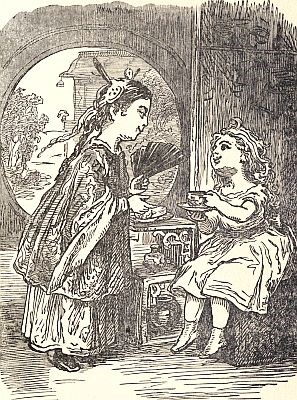
"Is it not good?" said the little hostess.
"Is it not good?" said the little hostess.
"It must be! You are the real tea people," said Lucy; "but I was waiting for sugar and milk."
"That would spoil it," said the Chinese damsel; "only outer barbarians would think of such a thing. And, ah! I see you are one! See, Ki-hi, what monstrous feet!"
"They are not bigger than your maid's," said Lucy, rather disgusted. "Why are yours so small?"
"Because my mother and nurse took care of me when I was a baby, and bound them up that they might not grow big and ugly like the poor creatures who have to run about for their husbands, feed silkworms, and tend ducks!"
"But shouldn't you like to walk without almost tumbling down?" said Lucy.
"No, indeed! Me, a daughter of a mandarin of the blue button! You are a mere barbarian to think a lady ought to want to walk. Do you not see that I never do anything? Look at my lovely nails."
"I think they are claws," said Lucy; "do you never break them?"
"No; when they are a little longer, I shall wear silver shields for them, as my mother does."
"And do you really never work?"
"I should think not," said the young lady, scornfully fanning herself; "I leave that to the common folk, who are obliged. Come with me and let me lean on you, and I will give you a peep through the lattice, that you may see that my father is far above making his daughter work. See, there he sits, with his moustachios hanging down to his chin, and his tail to his heels, and the blue dragon embroidered on his breast, watching while they prepare the hall for a grand dinner. There will be a stew of puppy dog, and another of kittens, and birds-nest soup; and then the players will come and act a part of the nine-night tragedy, and we will look through the lattice. Ah! Father is smoking opium, that he may be serene and in good spirits! Does it make your head ache? Ah! that is because you are a mere outer barbarian. She is asleep, Ki-hi; lay her on the sofa, and let her sleep. How ugly her pale hair is, almost as bad as her big feet!"
CHAPTER IX.
KAMSCHATKA
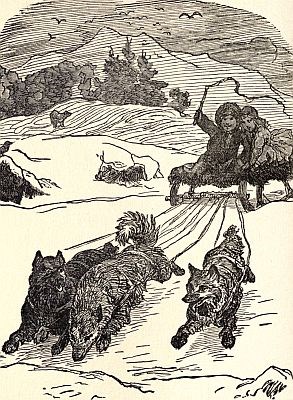
Whisking over the snow with all her might and main, muffled up in cloaks and furs.
Lucy had been disappointed of a drive with the reindeer, and she had been telling Don how useful his relations were in other places. Behold, she awoke in a wide plain, where as far as her eye could reach there was nothing but snow. The few fir-trees that stood in the distance were heavily laden; and Lucy herself,—where was she? Going very fast? Yes, whisking over the snow with all her might and main, and muffled up in cloaks and furs, as indeed was necessary, for her breath froze upon the big muffler round her throat, so that it seemed to be standing up in a wall; and by her side was a little boy, muffled up quite as close, with a cap or rather hood, casing his whole head, his hands gloved in fur up to the elbows, and long fur boots. He had an immense long whip in his hand, and was flourishing it, and striking with it—at what? They were an enormous way off from him, but they really were very big dogs, rushing along like the wind, and bearing along with them—what? Lucy's ambition—a sledge, a thing without wheels, but gliding along most rapidly on the hard snow; flying, flying almost fast enough to take away her breath, and leaving birds, foxes, and any creature she saw for one instant, far behind. And—what was very odd—the young driver had no reins; he shouted at the dogs and now and then threw a stick at them, and they quite seemed to understand, and turned when he wanted them. Lucy wondered how he or they knew the way, it all seemed such a waste of snow; and after feeling at first as if the rapidity of their course made her unable to speak, she ventured on gasping out, "Well, I've been in an express train, but this beats it! Where are you going?"
"To Petropawlowsky, to change these skins for whisky and coffee, and rice," answered the boy.
"What skins are they?" asked Lucy.
"Bears'—big brown bears that Father killed in a cave—and wolves' and those of the little ermine and sable that we trap. We get much, much for the white ermine and his black tail. Father's coming in another sledge with, oh! such a big pile. Don't you hear his dogs yelp? We'll win the race yet! Ugh! hoo! hoo! hoo-o-o!—On! on! lazy ones, on, I say! don't let the old dogs catch the young!"

